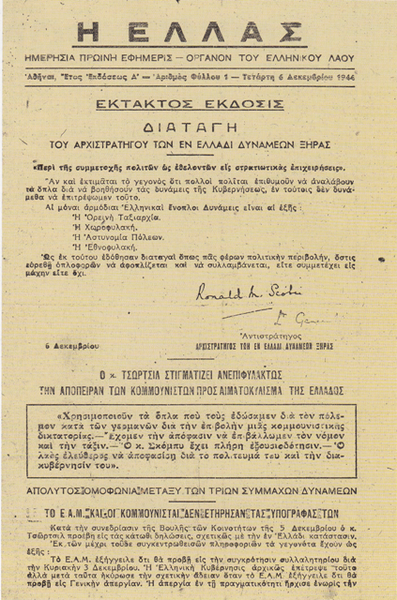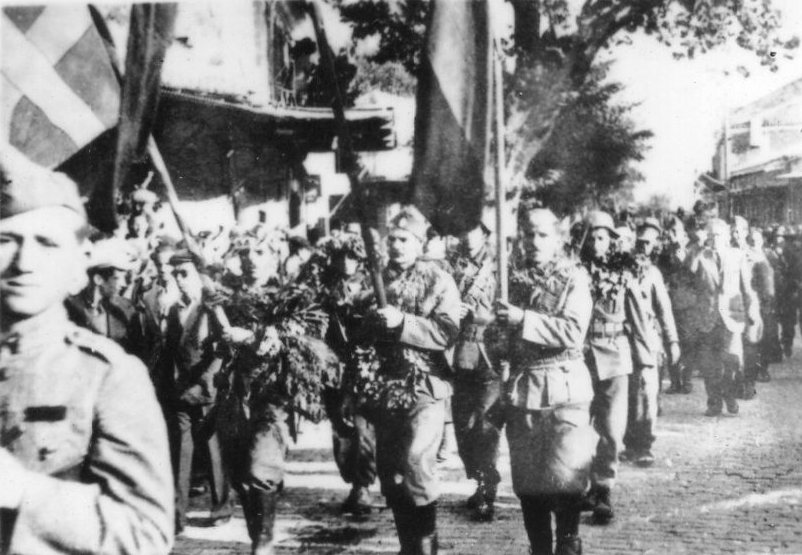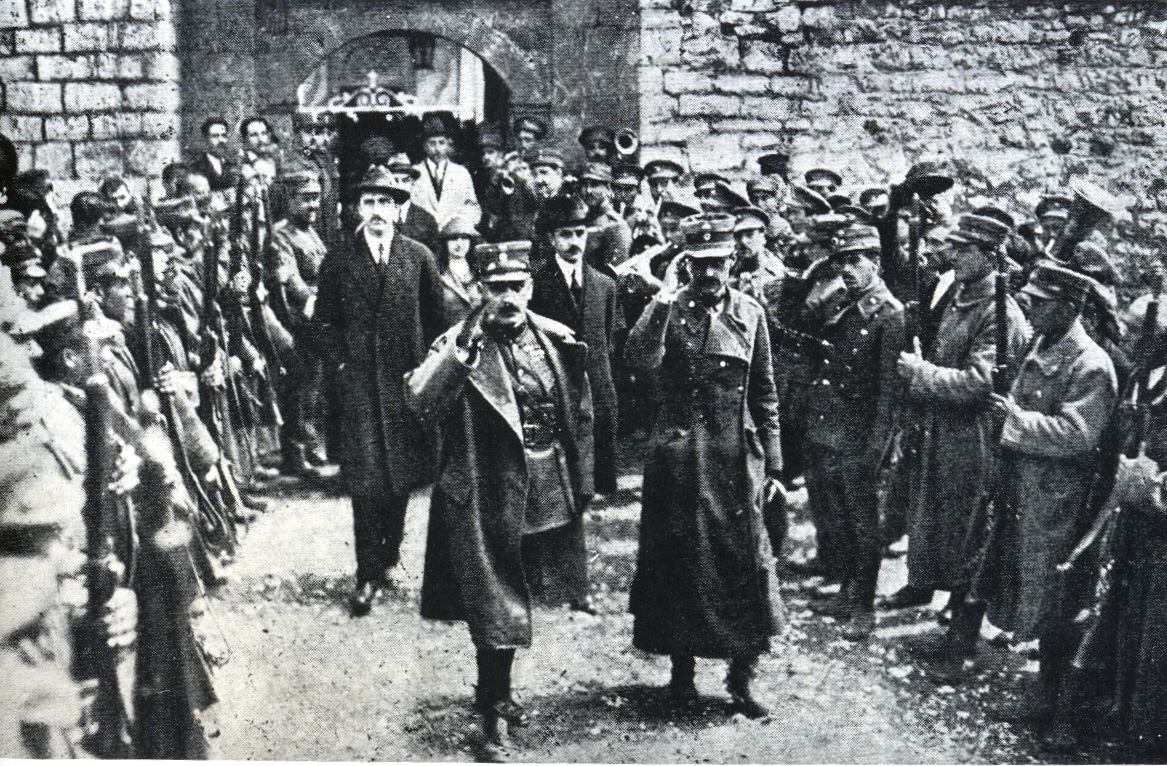|
Dekemvriana
The ''Dekemvriana'' ( el, Δεκεμβριανά, "December events") refers to a series of clashes fought during World War II in Athens from 3 December 1944 to 11 January 1945. The conflict was the culmination of months of tension between the communist EAM, some parts of its military wing, the ELAS stationed in Athens, the KKE and the OPLA from one side and from the other side, the , some parts of the Hellenic Royal Army, the Hellenic Gendarmerie, the Cities Police, the far-right Organization X, among others and also the British Army. Regardless of the tensions between the left and the right, in May 1944 it had been roughly agreed in the Lebanon Conference that all non-collaborationist factions would participate in a Government of National Unity; eventually 6 out of 24 ministers were appointed by EAM. Additionally, a few weeks before the withdrawal of the German troops in October 1944, it had been reaffirmed in the Caserta Agreement that all collaborationist forces would b ... [...More Info...] [...Related Items...] OR: [Wikipedia] [Google] [Baidu] |
Greek Civil War
The Greek Civil War ( el, ο Eμφύλιος [Πόλεμος], ''o Emfýlios'' [''Pólemos''], "the Civil War") took place from 1946 to 1949. It was mainly fought against the established Kingdom of Greece, which was supported by the United Kingdom and the United States and won in the end. The losing opposition held a self-proclaimed people's republic, the Provisional Democratic Government, Provisional Democratic Government of Greece, which was governed by the Communist Party of Greece (KKE) and its military branch, the Democratic Army of Greece (DSE). The rebels were supported by Socialist Federal Republic of Yugoslavia, Yugoslavia and the Soviet Union. The war has its roots at the WW2 conflict, between the Communist Party of Greece, communist-dominated left-wing Greek Resistance, resistance organisation, the National Liberation Front (Greece), EAM-ELAS, and loosely-allied anticommunist resistance forces. It later escalated into a major civil war between the state and the communist ... [...More Info...] [...Related Items...] OR: [Wikipedia] [Google] [Baidu] |
Organization X
The Organization ''X'' ( el, Οργάνωσις Χ; commonly referred to simply as ''X'' ("Chi" in Greek), and members as Chites (Χίτες)) was a paramilitary right-wing anti-communist royalist organization set up in 1941 during the Axis occupation of Greece. Initially an anti-Axis resistance organization, it gradually shifted its focus towards anti-communism. In 1951, ''X'' was officially recognized as a ''National Organization of Internal Resistance'' by the Greek Ministry of National Defense. Following the end of the Axis occupation, it played an active role in the persecution of communists during the White Terror and various military operations of the Greek Civil War, most notably the Dekemvriana. Foundation and activities during the Occupation Organization ''X'' was founded in 1941 by General Georgios Lavdas with Colonel Georgios Grivas acting as his chief of staff. Lavdas soon came into conflict with other members of the group because of his radical monarchist ideol ... [...More Info...] [...Related Items...] OR: [Wikipedia] [Google] [Baidu] |
Security Battalions
The Security Battalions ( el, Τάγματα Ασφαλείας, Tagmata Asfaleias, derisively known as ''Germanotsoliades'' (Γερμανοτσολιάδες) or ''Tagmatasfalites'' (Ταγματασφαλίτες)) were Greek Collaboration with the Axis Powers, collaborationist military groups, formed during the Axis occupation of Greece during World War II in order to support the German occupation troops. History The Battalions were founded in 1943 by the Hellenic State (1941–44), government of Ioannis Rallis. The Rallis cabinet passed the law raising the Security Battalions on 7 April 1943. The driving force behind raising the Security Battalions was the former dictator, General Theodoros Pangalos (general), Theodoros Pangalos, who saw the Security Battalions as his means of making a political comeback, and most of the Hellenic Army officers recruited into the Security Battalions in April 1943 were republicans who were in some way associated with Pangalos. The National ... [...More Info...] [...Related Items...] OR: [Wikipedia] [Google] [Baidu] |
Sacred Band (World War II)
The Sacred Band or Sacred Squadron ( el, Ιερός Λόχος) was a Greece, Greek special forces unit formed in 1942 in the Middle East, composed entirely of Greek officers and officer cadets under the command of Col. Christodoulos Tsigantes. It fought alongside the Special Air Service, SAS in the Western Desert (North Africa), Western Desert and the Aegean Sea, Aegean, as well as with General Philippe Leclerc de Hauteclocque, Leclerc's ''Free French Forces'' in Tunisia. It was disbanded in August 1945 but is the precursor to the modern Special Forces of the Hellenic Army. History Establishment Immediately after the Battle of Greece, German occupation of Greece in April–May 1941, the Greek government in exile, Greek government fled to Egypt and started to form military units in exile. The plethora of officers in relation to the number of ordinary soldiers, led Hellenic Air Force, Air Force Lt. Colonel G. Alexandris to suggest the creation of an Army unit, formed by office ... [...More Info...] [...Related Items...] OR: [Wikipedia] [Google] [Baidu] |
National Liberation Front (Greece)
The National Liberation Front ( el, Εθνικό Απελευθερωτικό Μέτωπο, ''Ethnikó Apeleftherotikó Métopo'' (EAM) was an alliance of various political parties and organizations which fought to liberate Greece from Axis Occupation. It was the main movement of the Greek Resistance during the occupation of Greece. Its main driving force was the Communist Party of Greece (KKE), but its membership throughout the occupation included several other leftist and republican groups. ΕΑΜ became the first true mass social movement in modern Greek history. Its military wing, the Greek People's Liberation Army (ELAS), quickly grew into the largest armed guerrilla force in the country, and the only one with nationwide presence. At the same time, from late 1943 onwards, the political enmity between ΕΑΜ and rival resistance groups from the centre and right evolved into a virtual civil war, while its relationship with the British and the British-backed Greek government ... [...More Info...] [...Related Items...] OR: [Wikipedia] [Google] [Baidu] |
Georgios Grivas
Georgios Grivas ( el, Γεώργιος Γρίβας; 6 June 1897 – 27 January 1974), also known by his nickname Digenis ( el, Διγενής), was a Cypriot general in the Hellenic Army and the leader of the Organization X (1942-1949), EOKA (1955-1959) and EOKA B (1971-1974) organisations. A specialist of guerilla and asymmetric warfare, he was one of the main actors in the Cypriot War of Independence, securing the independence of Cyprus against the British Empire. He died months prior to the 1974 Cypriot coup d'état by the EOKA-B, and it's still unknown if he was aware of it. Early life Grivas was born in the Chrysaliniotissa area of Nicosia on 6 June 1897, the fourth child of Kalomira Hatzimichael and Theodoros Grivas. He grew up in Trikomo. After attending his village school, he studied at the Pancyprian Gymnasium in Nicosia from 1909 to 1915, living with his grandmother during this time. Early military career In 1916, Grivas moved to Greece; according to his obitua ... [...More Info...] [...Related Items...] OR: [Wikipedia] [Google] [Baidu] |
Treaty Of Varkiza
The Treaty of Varkiza ( el, Συμφωνία της Βάρκιζας, also known as the Varkiza Pact or the Varkiza Peace Agreement) was signed in Varkiza (near Athens) on February 12, 1945 between the Greek Minister of Foreign Affairs and the Secretary of the Communist Party of Greece (KKE) for EAM-ELAS, following the latter's defeat during the ''Dekemvriana'' clashes. One of the aspects of the accord (Article IX) called for a plebiscite to be held within the year in order to resolve any problems with the Greek Constitution. This plebiscite would help establish elections and thus create a constituent assembly that would draft a new organic law. In another aspect of the treaty, both signatories agreed that the Allies send overseers in order to verify the validity of the elections. The accord also promised that members of the EAM-ELAS would be permitted to participate in political activities if they surrendered their weapons. Moreover, all civil and political liberties would be gua ... [...More Info...] [...Related Items...] OR: [Wikipedia] [Google] [Baidu] |
3rd Greek Mountain Brigade
The 3rd Greek Mountain Brigade ( el, 3η Ελληνική Ορεινή Ταξιαρχία, ''Triti Elliniki Οrini Τaxiarkhia'', ΙΙΙ Ε.Ο.Τ.) was a unit of mountain infantry formed by the Greek government in exile in Egypt during World War II. It was formed from politically reliable right-wing and pro-royalist personnel following a pro- EAM mutiny among the Greek armed forces in Egypt in April 1944. Commanded by Colonel Thrasyvoulos Tsakalotos, it fought in the Battle of Rimini in Italy (under I Canadian Corps), where it earned the honorific title "Rimini Brigade" ( ''Τaxiarkhia Rimini'') and against the EAM's Greek People's Liberation Army in the ''Dekemvriana The ''Dekemvriana'' ( el, Δεκεμβριανά, "December events") refers to a series of clashes fought during World War II in Athens from 3 December 1944 to 11 January 1945. The conflict was the culmination of months of tension between the c ...'' events in Athens. External links * Infantry brigades o ... [...More Info...] [...Related Items...] OR: [Wikipedia] [Google] [Baidu] |
Thrasyvoulos Tsakalotos
Thrasyvoulos Tsakalotos ( el, Θρασύβουλος Τσακαλώτος; 3 April 1897 – 15 August 1989) was a distinguished Hellenic Army Lieutenant General who served in World War I, the Greco-Turkish War of 1919–1922, World War II and the Greek Civil War, rising to become Chief of the Hellenic Army General Staff. He also served as Greece's Ambassador to Yugoslavia. Early life Tsakalotos was born in Preveza in 1897, at a time when it was still a province of the Ottoman Empire. At the age of thirteen, he went to Alexandria, to make the acquaintance of a cousin who lived there. Military career He entered the Hellenic Military Academy in 1913 and graduated from it as an Infantry 2nd Lieutenant on 1 October 1916. He fought at the Macedonian front of World War I, being promoted to Lieutenant in 1917, as well as in the Asia Minor Campaign, being promoted to Captain in 1920. In the interwar period he held various staff appointments and commands, as well as a teaching post i ... [...More Info...] [...Related Items...] OR: [Wikipedia] [Google] [Baidu] |
Georgios Papandreou
Georgios Papandreou ( ''Geórgios Papandréou''; 13 February 1888 – 1 November 1968) was a Greek politician, the founder of the Papandreou political dynasty. He served three terms as prime minister of Greece (1944–1945, 1963, 1964–1965). He was also deputy prime minister from 1950–1952, in the governments of Nikolaos Plastiras and Sofoklis Venizelos and served numerous times as a cabinet minister, starting in 1923, in a political career that spanned more than five decades. Early life Papandreou was born at Kalentzi, in the Achaea region of the northern Peloponnese. He was the son of Father Andreas Stavropoulos, an Orthodox archpriest (protopresvyteros). His last name is derived from his father's Christian name and the word ''papas'' "priest". He studied law in Athens and political science in Berlin. His political philosophy was heavily influenced by German social democracy. As a result, he was adamantly opposed to the monarchy and supported generous social policies, ... [...More Info...] [...Related Items...] OR: [Wikipedia] [Google] [Baidu] |
Archbishop Damaskinos Of Athens
Archbishop Damaskinos Papandreou ( el, Αρχιεπίσκοπος Δαμασκηνός Παπανδρέου), born Dimitrios Papandreou ( el, Δημήτριος Παπανδρέου; 3 March 1891 – 20 May 1949) was the archbishop of Athens and All Greece from 1941 until his death. He was also the regent of Greece between the pull-out of the German occupation force in 1944 and the return of King George II to Greece in 1946. His rule was between the liberation of Greece from the German occupation during World War II and the Greek Civil War. Early life He was born Dimitrios Papandreou (no relation to the Papandreou political family from Achaea) in Dorvitsa, Greece. He enlisted in the Hellenic Army during the Balkan Wars. He was ordained a priest of the Greek Orthodox Church in 1917. In 1922, he was made Bishop of Corinth. He spent the early 1930s as an ambassador of the Ecumenical Patriarch in the United States, where he labored to help organize the Greek Orthodox Archdio ... [...More Info...] [...Related Items...] OR: [Wikipedia] [Google] [Baidu] |
Kingdom Of Greece
The Kingdom of Greece ( grc, label=Greek, Βασίλειον τῆς Ἑλλάδος ) was established in 1832 and was the successor state to the First Hellenic Republic. It was internationally recognised by the Treaty of Constantinople, where Greece also secured its full independence from the Ottoman Empire after nearly four centuries. The Kingdom of Greece was dissolved in 1924 and the Second Hellenic Republic was established following Greece's defeat by Turkey in the Asia Minor Campaign. A military ''coup d'état'' restored the monarchy in 1935 and Greece became a Kingdom again until 1973. The Kingdom was finally dissolved in the aftermath of a seven-year military dictatorship (1967–1974) and the Third Hellenic Republic was established following a referendum held in 1974. Background The Greek-speaking Eastern Roman Empire, also known as Byzantine Empire, which ruled most of the Eastern Mediterranean region for over 1100 years, had been fatally weakened since the sackin ... [...More Info...] [...Related Items...] OR: [Wikipedia] [Google] [Baidu] |





